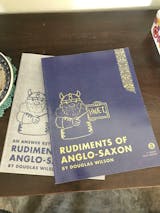Learn the language of Beowulf and King Alfred in thirty-two simple lessons!
Look Inside the Book
Look Inside the Answer Key
Why use "domicile" when you could use a great word like "home"? Sure, half of English on the whole may come from Latin, but the lion's share of everyday conversation—the real meat of our language—comes from Anglo-Saxon. If you want prose with a backbone, you should be studying the rumbling tongue of Anglo-Saxon. It was the language of Alfred the Great, and it gave us the tale of Beowulf. It's the source of vivid English words like ache, inkling, limber, lynch, and marshmallow.
Simply put, Rudiments of Anglo-Saxon is a distillation of the more academic and abstracted Old English grammars. Rudiments won't bury you in verbiage or leave you feeling like you should have been a linguist. In Unit One, the beginner will learn step-by-step basics of Anglo-Saxon grammar, from new letters like thorn and eth to strong and weak adjectives and beyond. Unit Two, while guiding the student through much of Mark's Gospel and Beowulf, introduces the fundamentals of translation from getting the right dictionary to deciphering poetry. Altogether, the textbook contains enough material for thirty-two happy weeks spent ransacking the Anglo-Saxon word-hoard.
FEATURES:
• Two units covering basic Anglo-Saxon grammar and syntax, and translations from most of Beowulf and Mark, with explanatory footnotes
• Thirty-two chapters, each structured by week to include five days of vocabulary, grammar, composition or translation work, and quizzes
• Weekly vocabulary lists teaching 2,000+ Anglo-Saxon words and highlighting English derivatives
• Two short glossaries (Anglo-Saxon to English, and vice versa)
• Extras including two memorization passages, two final exams, and suggestions for further reading
• An Answer Key for Rudiments of Anglo-Saxon with answers to all exercises, quizzes, translations, and unit tests. Time-saving and practical, it's a must for a teacher or student diving in to Old English on their own or in a classroom.
From the Book:
"There is another reason to dabble in Anglo-Saxon (and dabbling is certainly all that you will be doing with this text). For the writer who desires to fight with his prose, Anglo-Saxon derived words are powerful weapons—more powerful by nature, I would argue, than either Latin or Greek. This thesis is difficult to prove except by actually doing it yourself, so I would invite you to an experiment. Compose two versions of the same paragraph: once employing the vocabulary that enters naturally into your head (the majority of which will probably be Latin or Greek), and the next time using only words whose Anglo-Saxon roots you can unearth, which means you must go on a bit of a hunt through ye olde wordbook. You will find that not only are you driven to give more thought to your word choice, but your paragraph—the same paragraph you wrote before—will rouse the blood and quicken the beat, if only a little.
"The sharp reader will notice what I just did. The first half of the last paragraph is written using Latin and Greek words almost exclusively—words like thesis, except, invite, experiment, compose, paragraph, vocabulary, majority. But then the second half slides into pure Anglo-Saxon: time, words, roots, unearth, hunt, olde (everybody knows that one), driven, rouse, blood, beat.
"You actually don’t have to be much of a linguist to see the difference, and you certainly don’t have to be much of anything in order to hear the difference. Greek and Latin words are usually multi-syllabic with lots of tidy, easy-to-spot prefixes like a-, in-, ex-, super and para-. Anglo-Saxon words are harsher than their classical co-workers. They are shorter, stronger, with bits of earth still dusting their bones. They get fighters ready to form a shieldwall. The most famous passage in Winston Churchill’s Speech in the House of Commons (June 4, 1940) is a near-solid use of Anglo-Saxon derived words: “We shall fight on the beaches, we shall fight on the landing grounds, we shall fight in the fields and in the streets, we shall fight in the hills; we shall never surrender.” And out of the 460 words in Shakespeare’s “Saint Crispin’s Day Speech” in Henry V, a mere 40 are derived from Latin and only 3 from Greek, leaving over 90% rumbling along in their Anglo-Saxon roots." -From the Introduction
—
Douglas Wilson is a pastor in Moscow, Idaho, a father of three, and grandfather of seventeen. He is the author of numerous books, including Decluttering Your Marriage, Future Men, and How to Exasperate Your Wife.
Student:
PAGE COUNT: 248 pages
SIZE: 8.50x11"
ISBN 10: 1-591280-84-2
ISBN-13: 978-1-591280-84-2
PUB. DATE: 2012
Teacher:
AUTHOR: Douglas Wilson
PAGE COUNT: 122 pages
SIZE: 8.50x11"
ISBN 10: 1591280850
ISBN-13: 9781591280859
PUB. DATE: 2012
Need help planning this year?
Here are plans for every subject, every week, all year long.
Cart
Your cart is currently empty.
Start Shopping









